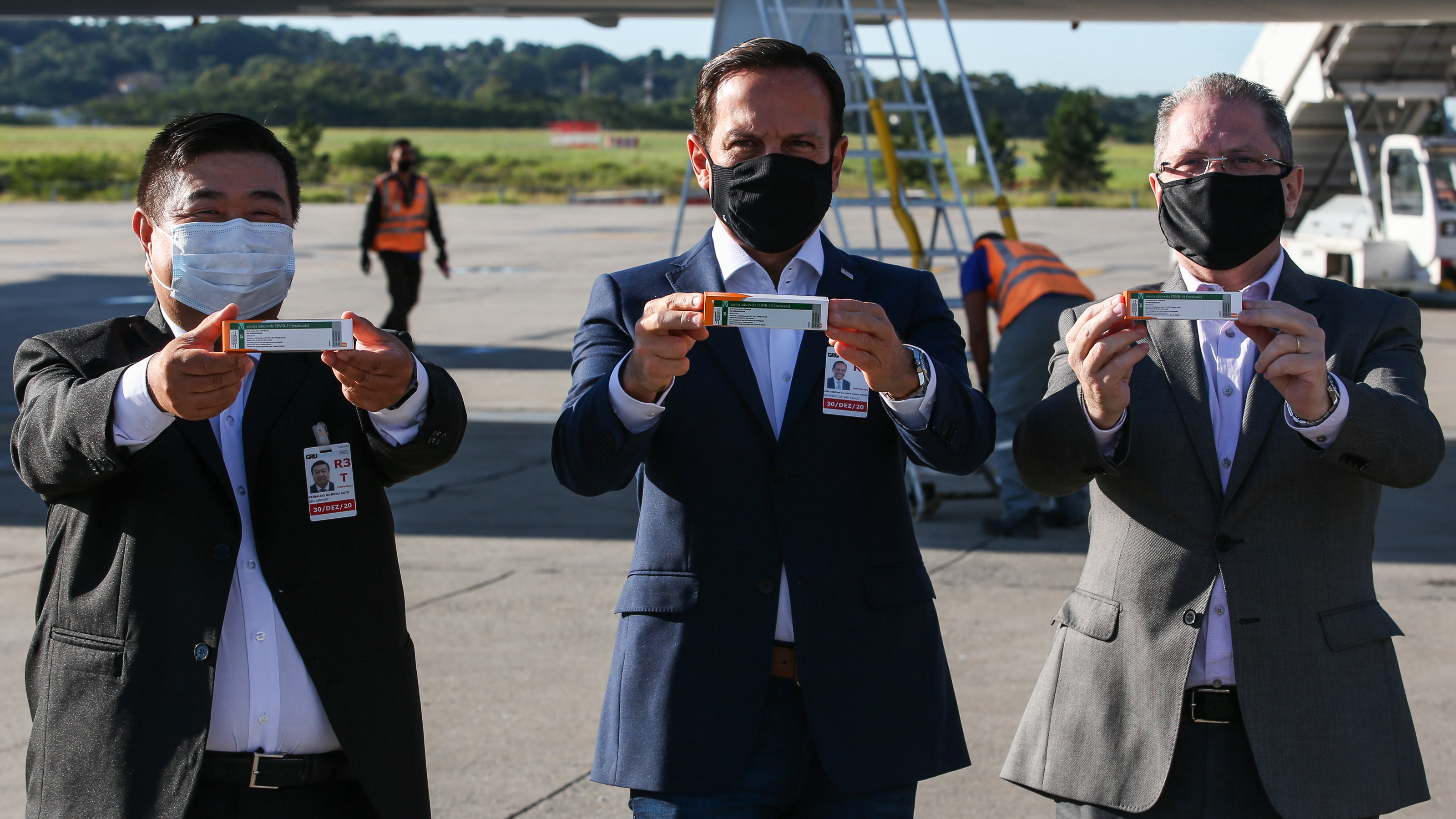
Superintendent of the Butantan Institute Reinaldo Noboru Sato, Governor of Sao Paulo Joao Doria and Sao Paulo state Health Secretary Dr. Jean Gorinchteyn hold boxes of the 1.5 million doses of the CoronaVac vaccine that arrived from China in the capital Sao Paulo in Sao Paulo, Brazil, December 30, 2020. /Getty
Superintendent of the Butantan Institute Reinaldo Noboru Sato, Governor of Sao Paulo Joao Doria and Sao Paulo state Health Secretary Dr. Jean Gorinchteyn hold boxes of the 1.5 million doses of the CoronaVac vaccine that arrived from China in the capital Sao Paulo in Sao Paulo, Brazil, December 30, 2020. /Getty
Editor's note: Alessandro Golombiewski Teixeira is a National Thousand Talent Distinguished Professor of Public Policy at the School of Public Policy and Management, Tsinghua University, and a professor of International Business at Schwarzman College in Tsinghua. He is a former special economic adviser to the president of Brazil and former minister of tourism, and minister of development, industry and foreign trade of Brazil. He was also president of the World Investment Association – WAIPA. The article reflects the author's views, not necessarily those of CGTN.
Political analysts assumed that building a political consensus around the hegemonic leadership of the United States in Latin America and the Caribbean (LAC) would be straightforward.
The governments elected from 2015 on were governments seeking to implement a liberal agenda at the economic level, involving a diminished role for the state, a reduction in workers' social rights and, at the political level, an almost automatic alignment with the foreign policies of former U.S. President Donald Trump.
Following the COVID-19 pandemic, the challenges of building a liberal agenda for a region led by the U.S. has reached previously unimaginable heights; not to mention the economic and social fallout playing out across the LAC region.
According to data from the United Nations Economic Commission for Latin America and the Caribbean (ECLAC), the average regional unemployment rate reached 8.4 per cent in 2020. A closer look at the economic growth data and the scenario is even less encouraging. The region has, according to ECLAC data, contracted by 7.7 percent in 2020 from its small growth of 1.7 percent in 2019. In the international trade area, it is estimated that the value of regional exports dropped by 13 percent in 2020, while imports shrank by 20 percent, according to new projections by ECLAC.
These figures, together with the failure to contain the epidemic in many countries in the region, such as Brazil, which accounts for almost 50 percent of the total cases in the region, paint a deeply concerning picture of the region's state of affairs.
It is important to highlight that in both the economic and public health spheres, the U.S. has done almost nothing to help or change the desperate economic and social scenarios in the region. At present, LAC is trying to find a solution to the pandemic crisis through its vaccination policy in order to try and revive its economy. In this sense, the region has depended almost exclusively on aid from Russia and China.
China has extended its hand to help countries that until recently were echoing America's bravado. China has promptly got into gear to send millions of doses of vaccines, as well as agreeing to set up local production cooperation for almost all the countries in the region.

Argentina's Entry Pavilion in the Green Global Commodity Trading Port, Shanghai, China, November 4, 2020. /Getty
Argentina's Entry Pavilion in the Green Global Commodity Trading Port, Shanghai, China, November 4, 2020. /Getty
This expansion in cooperation and in trade relations is clear from ECLAC figures. Total LAC-China trade has increased from $17 billion in 2002 to almost $315 billion in 2019. China's imports from Latin America and the Caribbean totalled almost $165 billion in 2019, representing almost 7.9 percent of China's total imports. China has become the main trading partner of Brazil, Chile, Peru and Uruguay and the second largest trading partner for many other countries.
Even with the election of Joe Biden, who could use Latin America to restore Washington's historic leadership in the region by focusing on multilateralism, China has earned its place in the region.
China has not only been an economic partner, but a strategic partner for LAC, through the deepening of multilateral institutions, such as the China-LAC Forum (CELAC established in 2014), Belt and Road cooperation platform and other mechanisms of cooperation. These areas of cooperation have helped LAC countries address structural problems in the region, like low infrastructure investment, poverty alleviation and unemployment.
The pandemic will be tackled in LAC countries with the Chinese help in areas such as science, technology and innovation. Cooperation with Chinese universities, research institutions and companies exchanging knowledge in areas other than public health will also pay dividends.
In addition to the pandemic assistance, China will play a very important role in the economic recovery of the region. By continuing to invest in regional infrastructure projects, China will in-turn reduce the cost of commodities produced in the region. If Latin America closes its infrastructure gap, the region could increase its annual growth by an estimated 2 to 3 percent. Moreover, the exchange of successful social development policies for the reduction of poverty and improvement of healthcare, education and sustainability would be a win-win cooperation agenda. This can be achieved by putting forward a common agenda for the LAC region: to seize opportunities to eradicate poverty and to pave the road to development.
The path for China and LAC countries to deepen and improve their partnership is clearly laid out. Achieving this should be an integral part of this year's development agenda for all governments involved. China has been – and will continue to be – a strategic partner for the future development of LAC countries.
(If you want to contribute and have specific expertise, please contact us at opinions@cgtn.com.)

